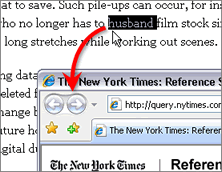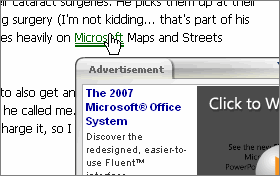 As a user experience professional, I appreciate good design and today I was pleasantly surprised by a new feature of the online version of The New York Times. I read a lot on the web and I come across quite a few words I don’t know (probably should have paid more attention in English class!). When I do, I go to straight to Merriam-Webster Online to look them up. The reason I choose M-W is that they allow you to listen to the pronunciation of the entries without having to sign-up for premium service (not the case with Dictionary.com).
As a user experience professional, I appreciate good design and today I was pleasantly surprised by a new feature of the online version of The New York Times. I read a lot on the web and I come across quite a few words I don’t know (probably should have paid more attention in English class!). When I do, I go to straight to Merriam-Webster Online to look them up. The reason I choose M-W is that they allow you to listen to the pronunciation of the entries without having to sign-up for premium service (not the case with Dictionary.com).
This is my usual routine when I come across a word I don’t know:
- Double-click the word to select it
- Press Ctrl-C to copy it
- Click the M-W icon in my Quick Launch bar
- Wait for the page to load
- Press Ctrl-V to paste the word
- Press Enter
It really doesn’t take that long, but it’s a bit of mousing and clicking. But while I was reading the NYTimes article, “The Afterlife Is Expensive for Digital Movies” today, I came across the word “husband” used in a different context than I’ve seen before. So I double-clicked the word to try and select it. It highlighted at first, but it didn’t stay selected. After a brief, “Huh?!” moment, a second browser window started to open. At first, I thought it was a pop-up ad, so I headed for the Close button. But as I was doing so, I saw the content and realized that it was a dictionary entry for the word “husband!” Cool, they read my mind!
The New York Times now has a Reference Search page “powered by” Answers.com with content from The American Heritage Dictionary. For grins, I clicked on the speaker icon for the pronunciation, but nothing happened. A look at IE7’s status bar showed me a script error, so it’s not perfect, but still great functionality.
This new feature seems to only be implemented on full article pages. If you’re on a section page, including the front page, clicking text which isn’t a hyperlink acts like normal; a double-click will select the word and a triple-click selects the whole paragraph. Which, by the way, is handy if you’re creating a manual entry on a social networking site like Del.icio.us or Digg and need to copy it. The biggest negative about this feature is its discoverability or lack thereof. A casual user may never double-click a word and find the hidden feature. But with time, I could see this spreading and becoming more prevalent across content sites and users will eventually become more aware. Even clicking a standard hypertext link was a learned behavior back in the day!
 Unfortunately, a few sites are now implementing keyword popover ads. With one version from Vibrant Media, green, double underlines indicate a word that has a contextual advertisement associated with it. These wouldn’t be so bad if their implementation were done right. But whenever I experience them, it’s “on accident,” as I’ve passed my mouse over one of the words. The problem is that there’s no delay on the hover, so if you quickly move your mouse to another part of the screen and its path happens over one of these keywords, you’ll get the pop-up. Annoying! To fight this problem, browser enhancement tools like IE7Pro can now block them.
Unfortunately, a few sites are now implementing keyword popover ads. With one version from Vibrant Media, green, double underlines indicate a word that has a contextual advertisement associated with it. These wouldn’t be so bad if their implementation were done right. But whenever I experience them, it’s “on accident,” as I’ve passed my mouse over one of the words. The problem is that there’s no delay on the hover, so if you quickly move your mouse to another part of the screen and its path happens over one of these keywords, you’ll get the pop-up. Annoying! To fight this problem, browser enhancement tools like IE7Pro can now block them.
BTW, if you were wondering what “husband” means as a transitive verb:
1. To use sparingly or economically; conserve: husband one’s energy.